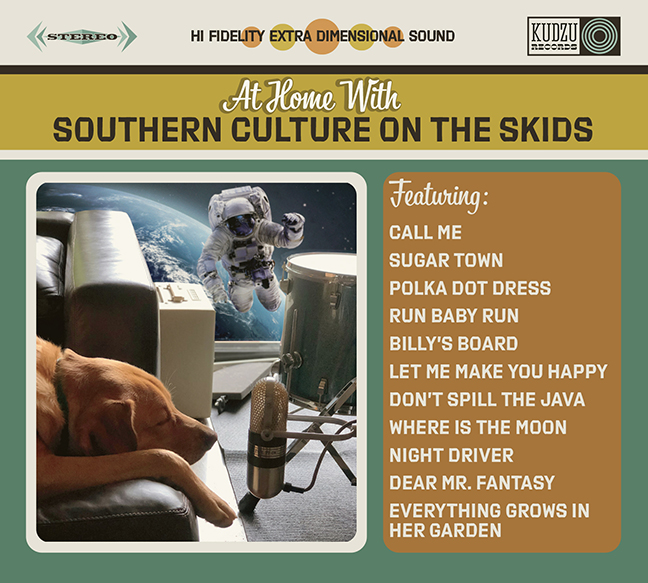It’s said that everyone who listened to the Velvet Underground back in the 60s immediately went out and started a band, and the same could be said for a lot of us who just managed to make it through 2020. Between shutdowns, cancellations, and furloughs, many of us found ourselves with a lot more free time than we’d bargained for – musicians and non-musicians alike – and the end result (one of the pandemic’s few bright spots) was a veritable explosion of terrific new music in 2021.
What did the past year bring, in our local music scene?
New Names. Arguably the biggest local-music news of the year hit in April, when the wildly popular duo Mandolin Orange (Emily Frantz and Andrew Marlin) announced they were changing their name to Watchhouse. “We have long been burdened by the dichotomy between our band name and the music we strive to create,” said Marlin. “Now that we can see a future where music is a shared experience again, we’re defining the space we share.” The new name – inspired by a hunting cabin where Marlin vacationed as a teenager – came with a new self-titled album and four hit singles through the spring and summer.
Triumphant Returns. 2021 also gave us new music from some of Chapel Hill’s most iconic, beloved artists – including some that we hadn’t heard from in decades. Leading the way were the Connells, whose Steadman’s Wake was their first album in 20 years (and their best since 1993’s seminal Ring). Southern Culture on the Skids hadn’t been dormant quite as long, but their 2021 album At Home With… was their best since (at least) 2004’s Mojo Box. Former Squirrel Nut Zipper Katharine Whalen dropped her best post-Zippers effort yet, a wonderful collection of Billie Holiday covers called To Hide A Heart That’s Blue. Not to be outdone, Superchunker Mac McCaughan unveiled a terrific solo album of his own, September’s The Sound of Yourself.
Listen to Aaron Keck’s conversation with the Connells’ Doug MacMillan.
Listen to Aaron’s conversation with Mary Huff and Rick Miller of Southern Culture on the Skids.
Listen to Katharine Whalen’s Jazz Squad’s February appearance on 97.9 The Hill’s “Live & Local.”
Beyond that, the year also saw stellar sophomore efforts from Blue Cactus, Dante High, Bat Fangs, and Jenn Wasner’s Flock of Dimes – not to mention great new music from prolific Durham-based legends Hiss Golden Messenger and the Mountain Goats.
And 2021 also gave us ‘new’ music that had been recorded decades earlier but never released. Iron & Wine’s Tallahassee Recordings featured songs Sam Beam had made in the 90s before he hit it big (including “Why Hate Winter,” which is now my favorite Iron & Wine song). Producer Mitch Easter unveiled Drive In, a lost 1987 album from the seminal Carrboro band Other Bright Colors. And we got a new song, “Ghost (Is Leaving Me),” from the Y2K-era Chapel Hill band Sorry About Dresden – recorded in 2001 but not released until October, five years after the sudden death of frontman Matt Oberst.
Equally Triumphant Debuts. Amidst all the output from established icons, we also witnessed the emergence of some great new artists as well – like Tre. Charles, whose debut single “Stressin” made a huge splash in the spring, or Jon Ward Beyle, who dropped his debut album Worth Stopping For in the fall. UNC alum Sarah Still completed The Birds in the Trees, a worth-the-wait album that had been in the works for over a decade. Cam Knopp, Jon Adam Green, Lynn Swisher Spears and David Prather unveiled their first solo efforts after long musical careers (Prather’s dating back to the 1950s!). Durham’s Matthew O’Connell designed his own custom synthesizer and released the album Half Mirror under the name Chorusing. Hank Close regrouped from Hank & Brendan’s breakup last year with a terrific solo effort, Guilty Pleasures (Are the Best Ones). And 97.9 The Hill’s own Jack Carmichael dropped his first two singles (plus a new Christmas tune) as Jack the Songman.
Listen to Jon Ward Beyle’s appearance on “Live & Local.”
Probably the most interesting debut, though, came from the band Speed Stick: genius drummers Laura King and Thomas Simpson recorded nine drum tracks and sent them out to some friends to do with them what they will. The result – January’s ambitiously-titled Volume One – was arguably the first great local album of 2021 (though many more would follow).
Grammy Nominations. Four local artists got big news in November when the year’s Grammy nominations were released. Rhiannon Giddens got a pair of nods for They’re Calling Me Home, her album with Italian musician Francesco Turrisi: the album was nominated for Best Folk Album, and the song “Avalon” (co-written with Justin Robinson) was nominated for Best American Roots Song. Electronica duo Sylvan Esso earned their second nomination for Best Dance/Electronic Album for 2020’s Free Love. Jazz legend Nnenna Freelon got her sixth nomination (her first since 2005) for Time Traveler, up for Best Jazz Album of the year. And Nnenna’s son Pierce Freelon got a nod of his own: his Black to the Future is up for Best Children’s Album.
Listen to Pierce Freelon’s recent appearance on “Live & Local.”
And Live Shows! After more than a year of shuttered venues and halting livestream attempts, the COVID-19 pandemic receded just far enough to allow bands and musicians to get back on stage again, at long last. Venues like Cat’s Cradle and Motorco got the ball rolling by setting up outdoor stages; concertgoers flocked to the Cradle in August for a “Psychic Hotline Block Party” with a powerhouse lineup (celebrating the launch of a new label) before heading inside for shows in the fall. The town of Chapel Hill launched a new September concert series at University Place, featuring artists like Kaze4Letters and Honey Magpie.
And 97.9 The Hill got into the act as well: we hosted Blue Cactus, Jonathan Byrd, and the Shoaldiggers in our “Live and Local Live” summer concert series, the first we’ve ever held in our long history.
Chapelboro.com does not charge subscription fees. You can support local journalism and our mission to serve the community. Contribute today – every single dollar matters.










